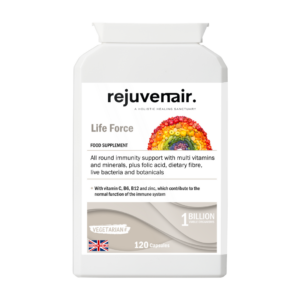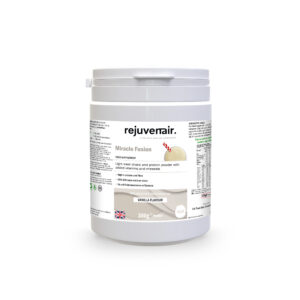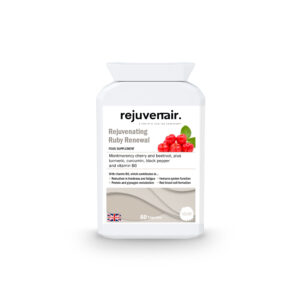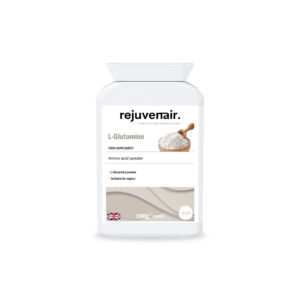Description
More than just a multivitamin, this formula is ideal for those who want to take just one daily supplement that does it all!
- 17 vital vitamins and minerals, backed by scientific studies, combined with…
- nutritious botanicals (alfalfa and seaweed (Fucus Vesiculosus))
- essential dietary fibre (from psyllium husk and sugar beet fibre)
- and live bacteria (probiotics – Lactobacillus Acidophillus, Bifidobacterium Lactis – providing 1 billion CFU).
This all-in-one formula has been designed for maximum impact – everything you need to feel your best in one easy capsule.
CONTAINS:
NO artificial bulking agents
NO glazing agents (hydroxypropyl cellulose, glycerol, carnauba wax)
NO artificial flow agents
NO anti-caking agents (magnesium stearate, silicon dioxide).
The vitamins and minerals
This comprehensive formula contains a broad spectrum of vitamins and minerals to support a variety of aspects of general health and wellbeing – everything from the immune system, energy levels, hormonal activity, bone health, hair, skin and nails and eye health, to muscle function, cognitive function, inflammatory response, liver function, heart function and much more – backed by science (see the specific EFSA approved health claims below).
The botanicals
Alfalfa
Alfalfa is a nutrient-dense food, rich in chlorophyll, along with vitamins (such as A, B6 and 12, C, D, E, K and P) and minerals (including magnesium, calcium, phosphorous and potassium). It also provides a rich source of alkaloids, isoflavones, coumarins, sterols and essential enzymes. As such, and because it is cooling, sweet, astringent legume, alfalfa has been used to relieve menopause symptoms, including hot flashes and night sweats. It can also help to prevent cholesterol absorption in the stomach.
Seagreens (Fucus Vesiculosus)
Known by the common name bladderwrack, Fucus vesiculosus is a seaweed that contains mucilage, algin, mannitol, beta-carotene, zeaxanthin, bromine, potassium, volatile oils, iodine and many other minerals. It was the original source of iodine, discovered in 1811. Iodine is an essential mineral for normal thyroid function, mammary gland development and foetal and infant neurological growth. It also has a powerful antioxidant and alkalising effect. It has also been shown to help women with abnormal menstrual cycling patterns and menstrual-related disease histories.
The dietary fibre
Psyllium husk
Psyllium is used as a natural laxative and bulking agent in the treatment of constipation and, in some cases, obesity.
Sugar beet fibre
Sugar beet fibre has been scientifically proven to contribute to an increase in faecal bulk in two ways:
1) the insoluble components of the fibre increase faecal bulk by absorbing water in the large intestine, while
2) the soluble components are fermented by bacteria in the large intestine leading to an increase in bacterial mass.
As such, this source of fibre may have a beneficial physiological effect for people who want to improve or maintain a normal bowel function.
The live bacteria (probiotics) – 1 billion CFU
Lactobacillus Acidophillus
Lactobacillus acidophilus (L. acidophilus) is a type of probiotic (“good” bacteria) found in the human gut, mouth, and vagina, and also in certain foods. People commonly use L. acidophilus for diarrhoea from antibiotics, as well as irritable bowel syndrome (IBS), overgrowth of bacteria in the vagina and an infection caused by the bacteria Helicobacter pylori (H. pylori). It is also used for acne, hay fever, eczema and many other conditions.
Bifidobacterium Lactis
Bifidobacterium animalis subsp. lactis (B. lactis) is a type of probiotic (“good” bacteria) that lives in the intestines. It produces lactic and acetic acid. “Good” bacteria such as B. lactis can help break down food, absorb nutrients, and fight off “bad” organisms that might cause diseases. B. lactis is a subspecies of B. animalis. It is found in the human gut and used in probiotic supplements. People use B. lactis for excessive crying in infants (colic), constipation, irritable bowel syndrome (IBS) and respiratory tract infections. It is also used for dental cavities, hay fever, diarrhoea and many other conditions.
Approved EFSA health claims:
- Vitamin B1 (thiamin) contributes to normal energy-yielding metabolism, normal functioning of the nervous system, normal psychological function and the normal function of the heart.
- Vitamin B2 (riboflavin) contributes to normal energy-yielding metabolism, normal functioning of the nervous system, the maintenance of normal mucous membranes, the maintenance of normal red blood cells, the maintenance of normal skin, the maintenance of normal vision, the normal metabolism of iron, the protection of cells from oxidative stress and the reduction of tiredness and fatigue.
- Niacin contributes to normal psychological function, normal energy-yielding metabolism, normal functioning of the nervous system, the maintenance of normal mucous membranes, the maintenance of normal skin and the reduction of tiredness and fatigue.
- Vitamin B5 (pantothenic acid) contributes to normal energy-yielding metabolism, normal mental performance, normal synthesis and metabolism of steroid hormones, vitamin D and some neurotransmitters, and the reduction of tiredness and fatigue.
- Vitamin B6 (pyridoxine) contributes to the normal function of the immune system, the regulation of hormonal activity, normal cysteine synthesis, normal energy-yielding metabolism, normal homocysteine metabolism, normal protein and glycogen metabolism and the reduction of tiredness and fatigue.
- Biotin (vitamin B7) contributes to normal energy-yielding metabolism, normal functioning of the nervous system, normal macronutrient metabolism, normal psychological function, normal hair and skin and the maintenance of normal mucous membranes.
- Vitamin B12 (cobalamin) contributes to normal energy-yielding metabolism, normal functioning of the nervous system, normal homocysteine metabolism, normal psychological function, normal red blood cell formation, normal function of the immune system, the reduction of tiredness and fatigue and it has a role in the process of cell division.
- Vitamin C contributes to maintaining the normal function of the immune system. It also contributes to normal collagen formation for the normal function of blood vessels, bones, cartilage, gums, skin and teeth, normal energy-yielding metabolism, normal functioning of the nervous system, normal psychological function, protection of cells from oxidative stress, the reduction of tiredness and fatigue, the regeneration of the reduced form of vitamin E and increases iron absorption.
- Vitamin D contributes to the normal function of the immune system and healthy inflammatory response, normal absorption/utilisation of calcium and phosphorus, normal blood calcium levels, the maintenance of normal bones, the maintenance of normal muscle function, the maintenance of normal teeth, it has a role in the process of cell division and is needed for normal growth and development of bone in children.
- Vitamin E contributes to the protection of cells from oxidative stress.
- Supplemental folic acid intake increases maternal folate status. Low maternal folate status is a risk factor in the development of neural tube defects in the developing foetus. The target population is women of child-bearing age and the beneficial effect is obtained with a supplemental folic acid daily intake of 400μg for at least one month before and up to three months after conception.
- Iodine contributes to normal cognitive function, normal energy-yielding metabolism, normal functioning of the nervous system, the maintenance of normal skin, the normal production of thyroid hormones and normal thyroid function and the normal growth of children.
- Iron contributes to normal cognitive function, normal energy-yielding metabolism, normal formation of red blood cells and haemoglobin, normal oxygen transport in the body, normal function of the immune system, the reduction of tiredness and fatigue, the process of cell division and to the normal cognitive development of children.
- Manganese contributes to normal energy-yielding metabolism, the maintenance of normal bones, the normal formation of connective tissue and to the protection of cells from oxidative stress.
- Selenium contributes to the maintenance of normal hair, the maintenance of normal nails, the normal function of the immune system, normal thyroid function and the protection of cells from oxidative stress.
- Zinc contributes to normal DNA synthesis, normal acid-base metabolism, normal carbohydrate metabolism, normal cognitive function, normal fertility and reproduction, normal macronutrient metabolism, normal metabolism of fatty acids, normal metabolism of vitamin A, normal protein synthesis, the maintenance of normal bones, the maintenance of normal hair, nails and skin, the maintenance of normal testosterone levels in the blood, the maintenance of normal vision, the normal function of the immune system, the protection of cells from oxidative stress and it has a role in the process of cell division.
- Sugar beet fibre contributes to an increase in faecal bulk.







There are no reviews yet.